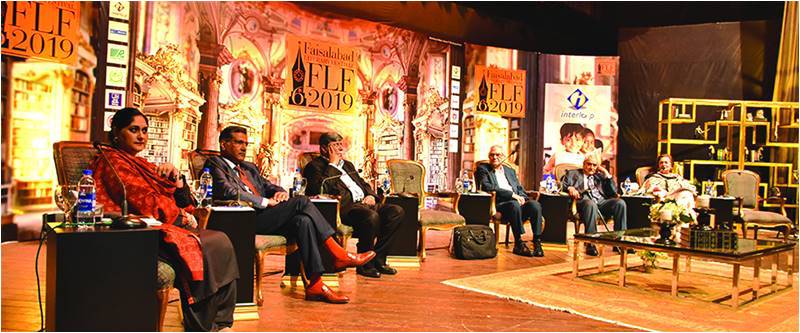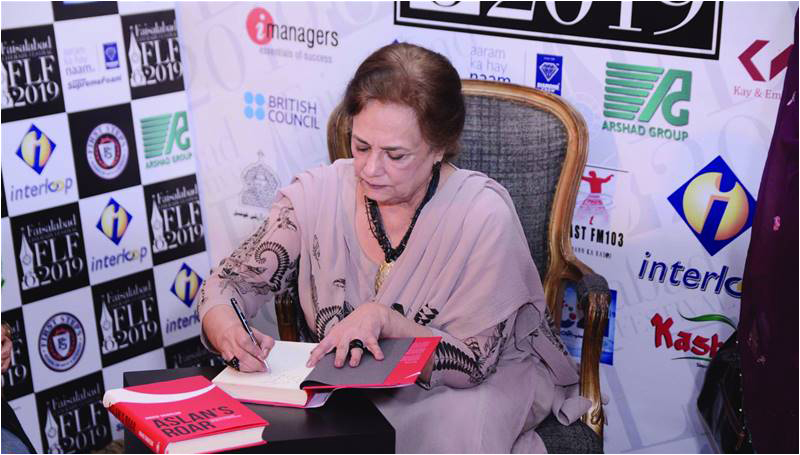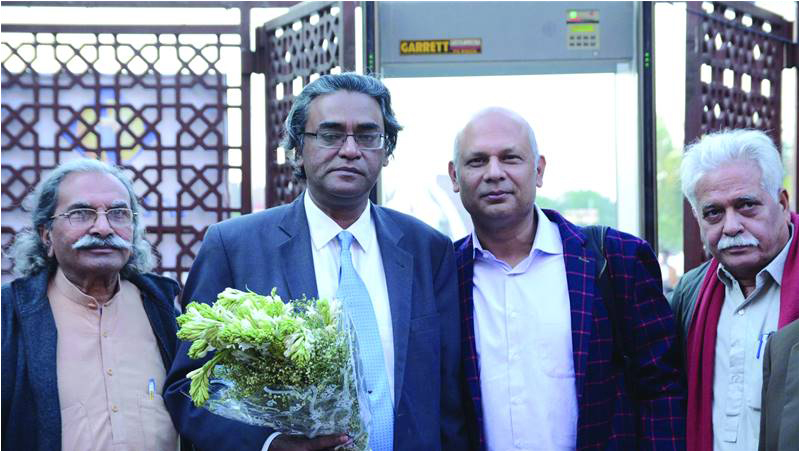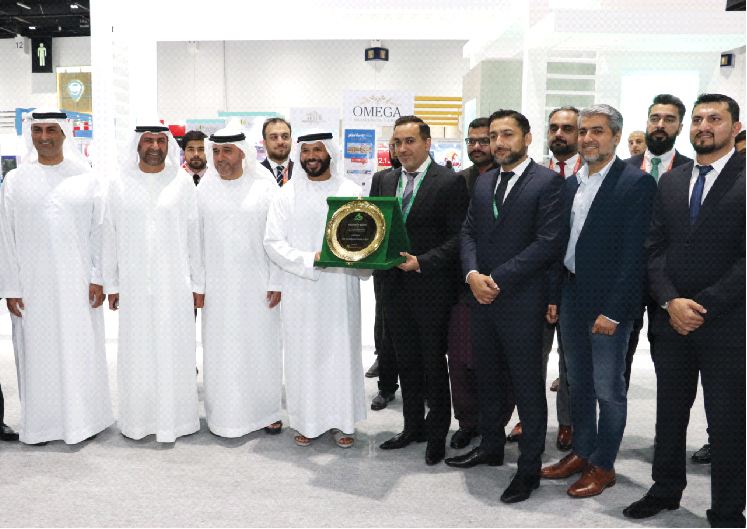
Faisalabad has joined the list of Pakistani cities with a vibrant and sustainable tradition of annual literary festivals.
Veteran journalist Masud Ashar in his presidential remarks at the Faisalabad Literary Festival (FLF) stated that we are living amidst national contradictions. A new generation wants to move forward while they are being constantly dragged towards backwardness. The vehicle, for him, is moving forward while we are compelled to keep looking backwards.
He pointed to how the electronic media are found presenting plays which could more accurately be described as “tableeghi” (i.e. having to do with religious preaching). He advised the youth to read better literature than what we currently produce in the name of fiction. His remarks were clearly about the need to avoid religious obscurantism – which now afflicts even the highest levels of power in the country.
“Superstition has increased – even the Prime Minister house is infected with it!” he noted.

For all its problems, he reminded the audience, the level of research in India is much higher than that in Pakistan. This makes talk of a “conquest of Hind” all the more ridiculous – something he alluded to by reference to red-cap-wearing zealots.
For his part, Asghar Nadim Syed in his address of welcome stated that soon like Lahore, Faisalabad would be on the cultural map of UNESCO and be recognized as a city of creativity. Dr. Sheeba Alam conducted the inaugural session.
Navid Shahzad, the keynote speaker at the Festival, delivered her address in English, titled “Women’s lives”. She said that she intended to talk about women, wisdom and growing old. And she cited the famous slogan from Mao Zedong’s revolutionary China, which held that “women hold up half the sky”. She pointed out that history is also witness to the fact that wisdom was associated with women more than men – not only in the ancient and classical past but even in Judeo-Christian times. She added there was a time when female wisdom was foundational to popular belief. But in contrast, men today consider themselves guardians of women in curtailing their lives within the confines of chaadar and chaar-devari; effectively disempowering them.

“This was not always the case. At the birth of society and civilization a religious landscape littered with feisty female deities makes wisdom women’s business. There is Nisaba the Babylonian goddess who looks after the stores of grain and knowledge in Mesopotamia; the Hindu goddess Saraswati; the Zoroastrian Anahita[…] But come the end of the Bronze Age and many of these deities were demoted. One of the results of this edging out of wise women and deities and to replace them with a thundering, male warrior god.”
She reminded the audience, “Bear in mind that women never start wars.”
In her talk, she extensively quoted from The Second Sex, written by the French writer Simone de Beauvoir, who wrote that “the myths proposed to women, whether in literature and history, science or psychoanalysis, encouraged females to believe that to be a woman was to be for others —-and especially for men.”
As far as the speaker herself was concerned, she claimed to have remained a teenager at heart despite being a grandmother. She disclosed that she was gifted a copy of Mirat-ul-Uroos, considered essential reading for a young bride.
Veteran journalist Mehmood Sham in his key note address observed that Literary Fests started effectively in the post-9/11 world. He went on to dispute the idea that reading books is a dead habit now. Taking a far more optimistic view, he observed that as long as boys and girls keep on indulging in love affairs, ghazals would be written. When there will be failed love affairs short stories would be written. And as long as there would be interaction between beauty and love, novels would continue to be written. In fact, for him, the internet has now accelerated this process.
Guest of Honour Syed Babar Ali noted that in pre-Partition days the owner of Lyallpur Cotton Mills Lala Murli Dhar used to organize a week-long literary festival. Moreover, he pointed out that Sultan Bahu, Baba Farid, Khawaja Farid, Shah Hussain and Bullah Shah had effectively resided within a 100-mile radius – and this can be the base for spreading their message of love in the Punjabi language.
There was a special session with poet Amjad Islama Amjad in which he read his poetry.
In total, there were eleven sessions next day, which included “Urdu fiction Kay Naye Ufaq” - conducted by Dr. Nasar Abbas Nayar. This session featured Masud Ashaar, Dr. Najiba Arif and Dr. Tahira Iqbal in discussion.
There were also the usual book launches now associated with lit-fests in the country. Navid Shahzad’s book Aslan’s Roar was launched here and Haris Khalique engaged her in discussion at that event. Another book launch was that of Tooti Hoi Tanab Udhar by veteran writer Asghar Nadim Syed. Dr. Nasar Abbas Nayar engaged Syed Asghar Nadim on the background and various aspects of the book. Asghar Nadim told the audience that his novel is based on historical, cultural and social aspects of his city Multan. He added that it was also about the decay of a cultural hub into a modern commercial city which has destroyed archaeology and architect. He called his novel a noha for Multan.
Tributes were paid to late writers Altaf Fatima, Khalida Hussain, Fehmida Riaz and Dr. Anwar Sajjad, who have left us in the recent past, by Masud Ashar, Kishwar Nahid and Yasmin Hamid.
Prof. Mushtaq Soofi and Prof. Saeed Bhutta thoroughly discussed the past, present and future of Punjabi. They were of the opinion that by not giving Punjabi its due and not adopting it as a medium of instruction in that province, the country is at a great loss – culturally and intellectually.
A session was conducted by Dr. Sheeba Alam and the participants were Dr. Arifa Syeda Zehra and Amer Sindhu, titled “Takhleeqi Zahanat Kay Khushk Hoatay Chashmay.” A session titled “Tareekhi virsa aur Humara Fun-e-Tameer” was conducted by Faisal Sajjad. The participants were veteran architect Nayyar Ali Dada and Vice Chancellor at the Institute of Art and Culture Sajida Vandal. The legendary architect Dada commented at one point, “Our cities have become ‘wahayat’!”
“Khird Kay Pass Khabar Kay Sawa Kuch Aur Nahin” was one of the most vibrant sessions because the participants were all great in the field of media: Ghazi Salauddin, Wajahat Masud and Haris Khalique. And it was hosted by musician Ali Aftab Saeed (of Beghairat Brigade fame).

Pakistan’s largest real estate portal, Zameen.com, has announced its decision to hold another massive edition of the Pakistan Property Show – scheduled to take place at the Dubai World Trade Centre on December 6 and 7. This 2019 edition is all set to become the company’s third consecutive annual property exhibition event in Dubai. In the last two expos, the property extravaganza attracted a combined audience of over 31,000.
Zameen.com has so far held a total of 17 major property exhibitions attracting over 1 million visitors.
Zameen.com CEO Zeeshan Ali Khan said that taking the property exhibitions to an international level was a tough undertaking in the beginning but with every passing year, Pakistan Property Show has become a brand name for property exhibitions. “The success story of this event is source of pride for Pakistanis living the Gulf,” he said. –PR
Veteran journalist Masud Ashar in his presidential remarks at the Faisalabad Literary Festival (FLF) stated that we are living amidst national contradictions. A new generation wants to move forward while they are being constantly dragged towards backwardness. The vehicle, for him, is moving forward while we are compelled to keep looking backwards.
He pointed to how the electronic media are found presenting plays which could more accurately be described as “tableeghi” (i.e. having to do with religious preaching). He advised the youth to read better literature than what we currently produce in the name of fiction. His remarks were clearly about the need to avoid religious obscurantism – which now afflicts even the highest levels of power in the country.
“Superstition has increased – even the Prime Minister house is infected with it!” he noted.

For all its problems, he reminded the audience, the level of research in India is much higher than that in Pakistan. This makes talk of a “conquest of Hind” all the more ridiculous – something he alluded to by reference to red-cap-wearing zealots.
For his part, Asghar Nadim Syed in his address of welcome stated that soon like Lahore, Faisalabad would be on the cultural map of UNESCO and be recognized as a city of creativity. Dr. Sheeba Alam conducted the inaugural session.
Navid Shahzad, the keynote speaker at the Festival, delivered her address in English, titled “Women’s lives”. She said that she intended to talk about women, wisdom and growing old. And she cited the famous slogan from Mao Zedong’s revolutionary China, which held that “women hold up half the sky”. She pointed out that history is also witness to the fact that wisdom was associated with women more than men – not only in the ancient and classical past but even in Judeo-Christian times. She added there was a time when female wisdom was foundational to popular belief. But in contrast, men today consider themselves guardians of women in curtailing their lives within the confines of chaadar and chaar-devari; effectively disempowering them.

“This was not always the case. At the birth of society and civilization a religious landscape littered with feisty female deities makes wisdom women’s business. There is Nisaba the Babylonian goddess who looks after the stores of grain and knowledge in Mesopotamia; the Hindu goddess Saraswati; the Zoroastrian Anahita[…] But come the end of the Bronze Age and many of these deities were demoted. One of the results of this edging out of wise women and deities and to replace them with a thundering, male warrior god.”
She reminded the audience, “Bear in mind that women never start wars.”
In her talk, she extensively quoted from The Second Sex, written by the French writer Simone de Beauvoir, who wrote that “the myths proposed to women, whether in literature and history, science or psychoanalysis, encouraged females to believe that to be a woman was to be for others —-and especially for men.”
As far as the speaker herself was concerned, she claimed to have remained a teenager at heart despite being a grandmother. She disclosed that she was gifted a copy of Mirat-ul-Uroos, considered essential reading for a young bride.
Veteran journalist Mehmood Sham in his key note address observed that Literary Fests started effectively in the post-9/11 world. He went on to dispute the idea that reading books is a dead habit now. Taking a far more optimistic view, he observed that as long as boys and girls keep on indulging in love affairs, ghazals would be written. When there will be failed love affairs short stories would be written. And as long as there would be interaction between beauty and love, novels would continue to be written. In fact, for him, the internet has now accelerated this process.
Guest of Honour Syed Babar Ali noted that in pre-Partition days the owner of Lyallpur Cotton Mills Lala Murli Dhar used to organize a week-long literary festival. Moreover, he pointed out that Sultan Bahu, Baba Farid, Khawaja Farid, Shah Hussain and Bullah Shah had effectively resided within a 100-mile radius – and this can be the base for spreading their message of love in the Punjabi language.
There was a special session with poet Amjad Islama Amjad in which he read his poetry.
In total, there were eleven sessions next day, which included “Urdu fiction Kay Naye Ufaq” - conducted by Dr. Nasar Abbas Nayar. This session featured Masud Ashaar, Dr. Najiba Arif and Dr. Tahira Iqbal in discussion.
There were also the usual book launches now associated with lit-fests in the country. Navid Shahzad’s book Aslan’s Roar was launched here and Haris Khalique engaged her in discussion at that event. Another book launch was that of Tooti Hoi Tanab Udhar by veteran writer Asghar Nadim Syed. Dr. Nasar Abbas Nayar engaged Syed Asghar Nadim on the background and various aspects of the book. Asghar Nadim told the audience that his novel is based on historical, cultural and social aspects of his city Multan. He added that it was also about the decay of a cultural hub into a modern commercial city which has destroyed archaeology and architect. He called his novel a noha for Multan.
Tributes were paid to late writers Altaf Fatima, Khalida Hussain, Fehmida Riaz and Dr. Anwar Sajjad, who have left us in the recent past, by Masud Ashar, Kishwar Nahid and Yasmin Hamid.
Prof. Mushtaq Soofi and Prof. Saeed Bhutta thoroughly discussed the past, present and future of Punjabi. They were of the opinion that by not giving Punjabi its due and not adopting it as a medium of instruction in that province, the country is at a great loss – culturally and intellectually.
A session was conducted by Dr. Sheeba Alam and the participants were Dr. Arifa Syeda Zehra and Amer Sindhu, titled “Takhleeqi Zahanat Kay Khushk Hoatay Chashmay.” A session titled “Tareekhi virsa aur Humara Fun-e-Tameer” was conducted by Faisal Sajjad. The participants were veteran architect Nayyar Ali Dada and Vice Chancellor at the Institute of Art and Culture Sajida Vandal. The legendary architect Dada commented at one point, “Our cities have become ‘wahayat’!”
“Khird Kay Pass Khabar Kay Sawa Kuch Aur Nahin” was one of the most vibrant sessions because the participants were all great in the field of media: Ghazi Salauddin, Wajahat Masud and Haris Khalique. And it was hosted by musician Ali Aftab Saeed (of Beghairat Brigade fame).

Zameen.com to hold Pakistan Property Show in Dubai
on December 6-7, 2019
Pakistan’s largest real estate portal, Zameen.com, has announced its decision to hold another massive edition of the Pakistan Property Show – scheduled to take place at the Dubai World Trade Centre on December 6 and 7. This 2019 edition is all set to become the company’s third consecutive annual property exhibition event in Dubai. In the last two expos, the property extravaganza attracted a combined audience of over 31,000.
Zameen.com has so far held a total of 17 major property exhibitions attracting over 1 million visitors.
Zameen.com CEO Zeeshan Ali Khan said that taking the property exhibitions to an international level was a tough undertaking in the beginning but with every passing year, Pakistan Property Show has become a brand name for property exhibitions. “The success story of this event is source of pride for Pakistanis living the Gulf,” he said. –PR

